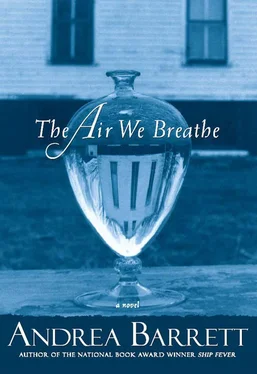Over the last six months, she explained, as he looked dubiously at her hands, she’d been thoroughly trained to drive by Eudora’s brother, who worked at the Tamarack Garage. She’d also learned a number of basic repairs, including how to change a tire and use the instruments tucked in the toolbox on the running board. “So you won’t need to worry about breaking down,” she concluded. “Also I know every road in the village, and most of what’s between here and Lake Placid. I can bring you wherever you want, at any hour.”
“Wednesdays are when I’d need you,” he said. “At least at first. You’re free then?”
Pushing aside her mother’s endless demands, and also the fact that the Model T in the carriage house wasn’t actually theirs, she said, “I can be.” The car, like all but their most personal belongings, really belonged to Eudora’s aunt, along with four more of Tamarack Lake’s most reputable cottages. Each was managed by an ambitious woman who, like Naomi’s mother, didn’t have the funds to buy a place of her own.
Last year Eudora’s aunt had coerced all five managers into buying identical Model Ts, the loans to be paid off in monthly installments added to the house rent. The car, meant to please prospective boarders who might be swayed at the thought of a doctor fetched more swiftly, had unexpectedly offered Naomi a scrap of freedom when her mother refused to learn to drive it. Yearningly the boarders, their own cars left at home, stroked the black fenders, but they weren’t allowed the exercise of turning the steering wheel and it sat until Naomi saw her opportunity. Within the month she’d appeared at the Tamarack Garage and persuaded Eugene to give her driving lessons. Soon she was picking up groceries and dropping off laundry, fetching packages from the station and sometimes driving a boarder to church or to visit a friend: all with her mother’s grudging approval. If she occasionally took a few minutes for herself during one of those errands, that was no one’s business but hers.
She smoothed her hair and turned toward Miles. “You’d be doing me a favor,” she said. “For me to have some time in your company, away from my work here…”
“You do work very hard,” he observed. “I see you working all the time.”
She shrugged, smiling, as if she were the sort of person who would never complain. A few more minutes of conversation, an easy negotiation about her wages, and they were agreed. With a smile she left his room, slipped out the front door without her mother noticing, and walked down to the garage to tell Eugene what she’d just done. A small job now might lead to something larger later; who knew what would happen once Miles was cured and back home running his business? She imagined herself in a city, typing in a handsome office; perhaps she could follow Miles back to Pennsylvania. Any road out of the mountains seemed appealing.
AT OUR END of the road, on the bulletin board in the dining hall, Miles had several weeks earlier persuaded Dr. Richards, our director, to pin this notice:
GROUP FORMING NOW
For the purposes of educational discussion and study. Male patients competent in written and spoken English are welcome to join in this exchange of work experience and other knowledge. Meetings to be held Wednesday afternoons, from 4 to 6 P.M., in the central solarium. I will give the opening talk or two. Please join us in this educational experiment. — Miles Fairchild
“Miles Fairchild,” one of us had said then. “Who’s that?”
“Who’s the us ?” asked someone else.
No one knew, although we saw that he’d done his research; the time he proposed fit into the only possible spot in our routine. Every day, then as now, we woke to a bell at six-thirty. After that, it was wash, dress, and breakfast at eight; doctors’ rounds and procedures until ten; rest cure until lunch at twelve; back to the porches after lunch to rest until four. We ate dinner at six and then cured again from seven to nine, with lights-out at nine-thirty. Our only free time, very precious, was that slot between four and six: which twenty-two of us offered up on the Wednesday following Leo’s release from the infirmary.
The sun was shining that afternoon, but the air streaming through the open windows already had a bite to it and we entered the solarium to find a slight man, with the same concave chest that many of us had and one shoulder drooping slightly lower than the other, standing in front of the fireplace with his jacket buttoned against the cold. A decade or so older than most of us, he wore a gray wool suit that looked new and expensive despite its old-fashioned cut. While we filed in he turned his head away from us, studying the framed documents above the mantel. Perched on the window seat nearest him was a slim girl — sixteen, we guessed; really she was eighteen — with flossy dark hair, an olive complexion, and deeply set blue eyes. She examined us as we settled hesitantly into the rows of chairs.
“Good afternoon,” the man said, turning back to scan our faces. “My name is Miles Fairchild, and this”—he gestured at the girl—“is my driver, Naomi Martin. Thank you for letting us join you today.”
Pacing confidently back and forth, with the sun glinting off his face, he said he wanted to start by giving us a little background about himself. He was thirty-seven years old and had been sick on and off for some time. A little more than a year ago, both his regular doctor and a consultant in Philadelphia had advised him to seek a cure in the Adirondacks. Since then he’d lived at Mrs. Martin’s boarding cottage in the village, which he was sure we knew.
A small slip, but we noticed it; we seldom went to the village, although it was so near. Who had money to shop? That Miles didn’t grasp this suggested how little he knew about our lives.
“Recently my health has improved,” he continued, “which has made it possible for me to think how I might be of use to others. Being sick is lonely, in addition to everything else. Boring, too. All of us need conversation, and instruction — which is what I hope to offer. It’s my idea that we’ll teach each other, thereby widening our horizons.”
As he spoke he moved from the window — nearly brushing, several of us noted, the skirt of his dark-haired driver, who nonetheless looked away from him — and then to the fireplace; to the window and back again, as regularly as a shuttle. We might, he continued, while we pondered his use of the word “thereby,” be in a public institution while he was in a private cure cottage; our means might be strained as his were not; perhaps we hadn’t attended school for long: none of this mattered. We all knew things of value, which we might share. At his home outside Doylestown, Pennsylvania, he, for instance, now managed the cement plant he’d inherited from his father.
For a moment, while he described his smoothly running plant, we thought we knew where he was going. His quarry, with its abundant limestone and shale; his grinding mill and his talented chemists and engineers; his vertical kilns, so technologically advanced. His special formulation for use in cement guns.
“I was one of the first to see the potential of Akeley’s invention,” he explained. “After the Cement Show of 1910, when the perfected cement gun was exhibited, others hopped on the bandwagon — but my engineers had already begun to modify the device, and we’ve since developed varieties of gunite that exploit the qualities of our cement and also make the best possible use of the double-chambered gun. Our materials have been used in the construction of dams and water tunnels, to resurface worn buildings and coat the steel columns for new…”
We listened with interest while he spoke in this vein. But after a while — oddly, we thought; what kind of speaker turns away just as he’s captured his audience? — he paused, drew a deep breath, and said, “But that’s only my work, and that’s enough about that. Since I was a boy, all my free time has been spent collecting and preserving the fossils of extinct vertebrates, and that’s really what I want to tell you about.”
Читать дальше












